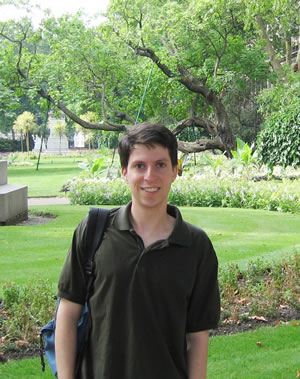Catching up with Jay Bikoff
 When Huntington High School’s Class of 1995 gathered on the Blue Devil football field for the school’s 134th commencement exercises nearly 13 years ago, seniors listened to valedictorian Jay Bikoff tell the group it had reached “the end of innocence.” It was time for them to go out into the world and leave their mark.
When Huntington High School’s Class of 1995 gathered on the Blue Devil football field for the school’s 134th commencement exercises nearly 13 years ago, seniors listened to valedictorian Jay Bikoff tell the group it had reached “the end of innocence.” It was time for them to go out into the world and leave their mark.
Mr. Bikoff himself is well on his way to doing just that. Following that overcast June day, the 240 member strong class headed off in different directions to pursue their personal and professional hopes and dreams, led by a valedictorian who all these years still commands respect at his alma mater at the mere mention of his name.
In the fall of 1995 Mr. Bikoff began his studies at Brown University in Rhode Island, where he later obtained a Bachelor of Science degree in biology and found time to enjoy the local cuisine, despite a crushing academic load. “Providence has great Italian food,” he recounted in showing his lighter side during a recent interview. It was at Brown that he started down the path leading to what has become his life’s work.
“I became interested in the development and function of the nervous system, and so after graduating college I entered the Ph.D. program in neurobiology at Harvard,” Mr. Bikoff said. He earned his doctorate last June and is now planning to move back to New York later this year to perform post-doctoral research at Columbia University. It’s the next step necessary if he chooses to become a college professor.
During his Huntington High School years Mr. Bikoff was highly respected, serious and well-liked by both students and teachers. He won just about every academic honor available and was widely regarded as destined for success.
At Huntington, Mr. Bikoff participated in such activities like the National Honor Society and Mathletes. He also earned a prestigious internship at Cold Spring Harbor Lab when he was selected for the Partners for the Future program that pairs leading high school students with world renowned research scientists.
Huntington served one of its best students ever quite well. “I had many good teachers, but one in particular who stood out was Richard Kurtz,” Mr. Bikoff said. “He taught A.P. Biology, and was the person who recommended that I apply to the Partners for the Future program at Cold Spring Harbor Lab. I think if you were to ask my classmates, many of them would have very fond memories of Mr. Kurtz, both because he was an excellent teacher and a funny guy. Certainly, he encouraged me to continue on in science.”
During his high school valedictory address, Mr. Bikoff challenged classmates to find out how to nurture “the spark of the divine” in their lives by building upon the foundation laid down by parents and the school system. He said education was “more than compilation of facts.” Rather, it’s an opportunity to learn how to think and to realize the value of knowledge, he said. He has measured up to those lofty words in his own life.
Since his days at Huntington, Mr. Bikoff has obtained degrees from Brown and Harvard and will soon head to his third Ivy League school for still more study. Yet, he is quick to recall with fondness his high school years and his former classmates, many of whom he warmly remembers to this day. “I went to school with some really wonderful kids,” he said.
At Harvard, Mr. Bikoff has been involved in cutting edge research. “Our lab, located at Children's Hospital Boston, studies how environmental signals regulate activity-dependent changes in the nervous system,” the boyish looking scholar explained.
“Traditionally, we've used mouse models to study the effects of neurotransmitter release on gene expression, and how this process regulates synapse development and function,” Mr. Bikoff said. “More specifically, my work has focused on structures in the brain called dendritic spines. These are small protrusions from dendrites and are the main sites of excitatory synaptic transmission in the brain. They are interesting because they can form and change shape in response to experience, so you could imagine that it might be part of the mechanism by which memories and other experiences are encoded in the brain.” (To learn more about this research, log onto www.childrenshospital.org/research/greenberg/.)
At Columbia it will be more hard work for Mr. Bikoff. “I’ll study how the neuronal circuitry in the spinal cord develops,” he said. It’s certainly an exciting time in the life of Huntington’s 1995 valedictorian.
All graphics, photographs, and text appearing on the Huntington Public Schools home page and subsequent official web pages are protected by copyright. Redistribution or commercial use is prohibited without express written permission. Comments or Questions? email the Public Information Office